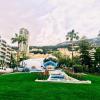Not too long ago, you were an enthusiastic, wide-eyed freshman, unfamiliar with your new university and the college culture. It may have been your first time leaving home, attending a new school, or going to a place where you knew no one. Trying to adjust resulted in some mistakes. You would be lying if you said that you did not feel homesick from time to time. In a way, studying abroad compares to the start of college. However, this time, you are exposed to a distinct culture, a mix of languages, and a diversity of people.
Here are some tips to tackling the 'study' in study abroad in Nice:
1. Talk to your university advisors before arrival.
You definitely want your time studying abroad to count, and your study abroad and academic advisors can recommend the best classes for you.
2. Consider whether you want to take classes at IES Abroad, SKEMA Business School, or both.
Located in the center of Nice, the IES Abroad Center is convenient. You only take classes with other American students in the program, so they are generally smaller. There is a more limited course selection. At SKEMA, you are enrolled with many international students. There may only be a few American students in your courses. The commute is longer with a 45-minute bus ride to get to Sophia Antipolis where SKEMA is located. However, SKEMA has a wider range of classes available.
3. Be flexible about your schedule.
I received my class schedule at SKEMA orientation the first week I arrived in Nice. The schedule you receive may not be exactly what you wanted, so make sure to brainstorm extra class options. Differing from the easy online process at my home university, add/drop at SKEMA involved a long line to talk to the exchange student advisor. The experience could be frusturating at times as it was difficult to get into some classes. Do not be discouraged; it will work out. I found that attending the desired class and nicely asking the professor about the possibilty of being added worked best.
4. Find a balance.
Study abroad is an exciting time to learn outside the classroom about places, language, and culture. However, being diligent about work and studying is essential to succeed. The difficulty and approach of classes may differ from your home university. In general, there is less homework given. Your grade relies on major assignments, like a midterm, a project, and a final. Therefore, plan ahead to not fall behind, to limit stress, and to find a balance.
5. Explore study spaces.
There are many cafés in Nice to check out, like Emilie and the Cool Kids. The IES Abroad Center is open until dinnertime and is also a productive place to study. Even then, you may like your quiet apartment best, especially since a lot of study spaces close early. Find what works for you.
6. Embrace the differences.
At IES Abroad and especially SKEMA, you will be interacting with students who come from a different background. With that said, group projects may be intimidating at first. I have had a few where the language barrier led to miscommunication. However, these blunders are the most valuable as each time I take away a greater understanding of how to work well in a group. These small interactions show me the importance of international experience.
At my U.S. university, I have classes that meet two or three times per week. In Nice, my classes meet once a week and last three hours.
A typical Tuesday and Wednesday at SKEMA for me look like this:
6 AM: Wake up and get ready
6:35 AM: Walk 10-minute to Lycée Masséna bus stop and go to SKEMA
We take the 230 bus and it's actually comfortable (enough for a quick nap).
7:30 AM: Arrive at SKEMA
8 AM: First class (International Business on Tuesdays, Intermediate French on Wednesdays)
My International Business class is lecture-style with powerpoints, while my French class is mainly discussion.
9:45 AM: 15-minute break
These breaks demonstrate a culture difference. While most French students take the break to smoke, American students fill up their water bottles, grab a coffee, or buy food from the vending machine (the waffles are a guilty pleasure).
10-11:15 AM: 2nd half of class
11:30 AM: Lunch break
I usually go to the smaller cafeteria where they have salads and sandwiches. This is a nice break to meet up with friends and to do work.
1:15 PM: Second class (Statistics for Business on Tuesdays, Globalization and Development on Wednesdays)
For my Statistics for Business class, we follow a booklet of all the notes. This class requires a lot of outside work and we have quizzes each week. Globalization and Development is lecture-style combined with case studies and a group project on a European industry.
2:45 PM: 15-minute break
3-4:30 PM: 2nd half of class
4:30 PM: Take bus back to SKEMA
6 PM: Arrive back at apartment in Nice
7. Be positive.
While there are days where you will miss your home university, remember to make the most of your four months studying abroad. It is an immersive opportunity to learn about culture and people in general. It is natural to experience sadness or frustration some days. However, managing those little bumps and staying enthusiastic will lead to better outcomes.

Emma Desjardin
My name is Emma Desjardin and I'm traveling to Nice, France, but my French last name is spelled wrong. Desjardins translates to "of the gardens" but somewhere in the past I lost the "s" and my green thumb. I love language and am excited to write about my experiences. I hope that in my adventures abroad I can find myself and learn a little bit about where that "s'" went.








